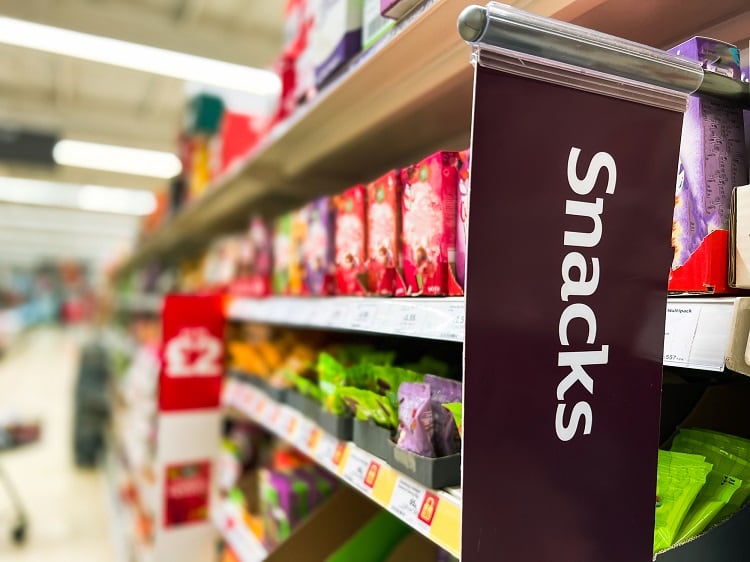In the UK, households on lower incomes are spending £250m (€283m) more than affluent households on unhealthy food and drink, according to a new report from health advocacy Impact on Urban Health and challenger brand builder Mission Ventures.
A major issue is affordability: as a general rule, healthier products tend to carry more expensive price tags.
But through working with the Good Food Programme – a fund supporting ten healthier challenger brands over two years – the two organisations are convinced it’s possible to develop products that are both healthy and affordable.
Putting healthy food in the spotlight
In the UK grocery market, ten categories are currently lacking both affordable and healthier options.
The ‘worst offenders’ according to the Good Food Programme’s report 'How can innovation support a healthier food & drink industry', are frozen ready meals, frozen processed poultry like chicken nuggets and frozen savoury bakery such as sausage rolls. Households on lower incomes are spending up to £376m more on these categories than affluent households.
In northern England, the problem is even more acute, according to youth activist James Kelly, youth board alumni of BiteBack 2030 – a charity founded by chef Jamie Oliver. In the north of England, there are food deserts ‘where junk food is the only option’, he told delegates at a Good Food Programme event in London.
Kelly is particularly concerned about the impact on young people. “The food industry isn’t set up for young people,” he stressed. “It should be easier to access nutritious food, but it isn’t.”
The youth activist is calling for collaboration between industry players, notably manufacturers and retailers, to put ‘healthy food in the spotlight’.
Ensuring healthy food is affordable
The situation is exacerbated by the current cost-of-living crisis. Rising input costs, coupled with rising inflation, means that consumers are finding it harder to access healthy food.
Kelly, a university student living in Manchester, has observed this first-hand. With tuition costs and rent to pay, he says students are cutting back on the amount they spend on food. The cheaper options are also the unhealthier options, he explained, saying he expects the cost-of-living crisis to be exaggerating the problem.
But challenger brands have the potential to play a positive role here, Kelly believes. For starters, there is appetite for new brands amongst youths: “Young people want to see new brands,” he told delegates. “Consumers and young people like to try new things.”
Further, young people no longer trust the ‘big brands’. “We’ve been lied to for so long,” said Kelly, suggesting that major manufacturers ‘bombard’ students with false health claims on social media.
When healthy food is available, and affordable, young people ‘naturally gravitate’ towards them, however, we were told. So how can healthier challenger brands keep their prices low?
For entrepreneur Rushina Shah, founder and director of challenger snacks brand Insane Grain (a member of the Good Food Programme cohort), encouraging manufacturers to believe in your vision is part of the solution. The challenger brand sells snacks – made from ancient grain sorghum – that are lower in salt and fat than average crisps.
By area, more than 90% of the world’s sorghum is found in developing countries such as Africa and Asia. “Using alternative grains, such as sorghum, naturally helps keep the price down,” she told delegates at the Good Food Programme event.

Insane Grain comes with added nutritional and environmental sustainability benefits: aside from using climate-resilient crop sorghum, the snacks product contains fibre, vitamin B12, and probiotics for gut health.
Interestingly, consumers are less fussed about which grains the brand is using, but absolutely do care about the nutritional benefits they offer, Shah revealed.
Innovation beats reformulation
Insane Grain, which achieves a Nutri-Score ‘B’, has been HFSS-compliant from the get-go.
Its competitors, however, now find themselves in a position of having to reformulate to reduce fat, salt, and sugar levels, as well as overall calories, to comply with the UK’s laws. In October last year, rules limiting the location of unhealthy foods in shops came into play.
Others, however, were delayed. Rules banning multibuy deals on foods and drinks high in fat, salt or sugar (HFSS) – including buy one get one free (BOGOF) are expected to come in later this year. Restrictions banning HFSS adverts on TV before 9pm and paid-for adverts online have been pushed back until early 2024.
For Shah, such regulations put Insane Grain ahead of the game. “Brands that are HFSS-compliant from the get-go are important. Competitors are now becoming HFSS-compliant, but in doing so, are decreasing their taste.”
The Insane Grain director doesn’t believe that being low-HFSS is ‘enough anymore’. “You can’t be an empty calorie snack,” she told delegates. It’s about positive nutrition, she suggested, pointing to the micronutrients and probiotic content of her products.
Putting the pressure on regulators
Youth activist Kelly is disheartened by the decision to postpone some of the new HFSS rules, which the Government put down to the ‘unprecedented global economic situation’, while also giving industry more time to prepare for the restrictions on advertising.
“Governments have the power [to create change] and need to be held accountable,” Kelly told delegates.
“People say healthy food is a choice. But in an ocean of junk food, you don’t really have a choice anymore.”
Mission Ventures, too, is campaigning for HFSS regulations to come into force, now.
“HFSS was working, and we believe the government should go full throttle on its initial intentions instead of dragging its heels on genuinely good legislation,” said Louis Bedwell, managing director and co-founder at Mission Ventures.
But even before the original HFSS deadline, Mission Ventures observed a ‘fleet’ of start-ups seeking to challenge house-hold alternatives take off. And sales data shows that families living on lower incomes may switch to these healthier challenger brands once they are distributed and match competitors’ pricing and promotions.
Keen to hear more about how better-for-you brands can be developed to meet the needs of young people? Louis Bedwell, co-founder and managing director Mission Ventures, will be speaking at our upcoming face-to-face event in London Positive Nutrition 2023: Healthy Food for the Mass Market alongside James Toop, CEO of Bite Back.
Over the course of three days (29-31 March), FoodNavigator journalists will be joined by a host of experts from dieticians and nutritional scientists to food entrepreneurs and big brands to examine how the latest nutritional science and technology can meet evolving consumer demands.
For more information or to register, click HERE.





